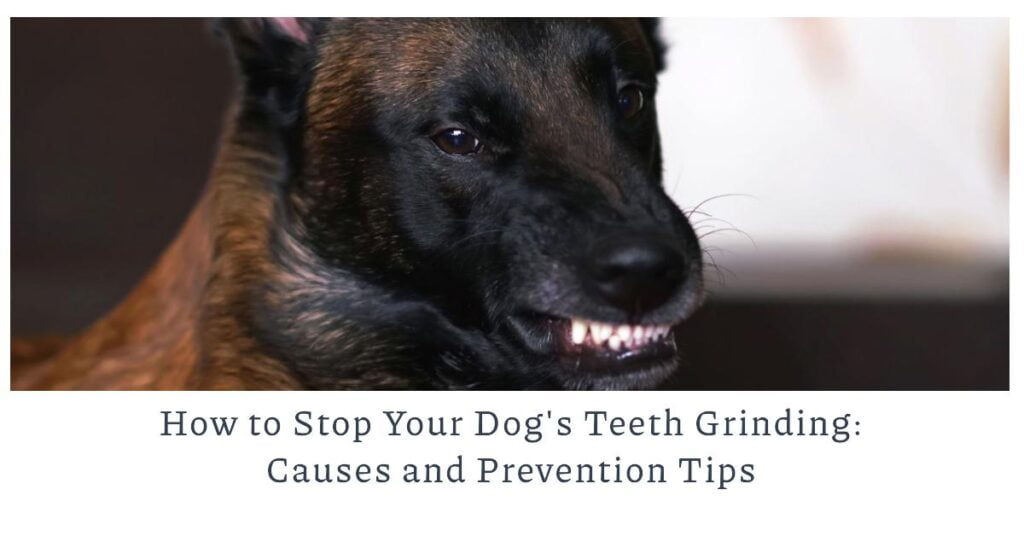If you have ever heard your dog making a grinding noise with their teeth, you may have wondered what this strange behavior means. Teeth grinding, also called bruxism, is a common issue in dogs.
Table of Contents
There are several possible reasons why dogs grind their teeth.
One of the main causes is pain or discomfort. Just like humans, dogs may grind their teeth as a response to pain anywhere in their body. Dental problems such as gum disease, tooth infections, or misaligned teeth can lead to grinding as the dog tries to find a comfortable jaw position. Ear infections that cause pain in the jaw area can also trigger teeth grinding. Other sources of bodily pain like arthritis, bone cancer, or stomach upsets may prompt this behavior as well.
Stress and anxiety frequently cause teeth grinding too. Dogs experience stress from loud noises, changes in routine, separation from owners, new environments, and other situations they perceive as threatening. The grinding motion may help relieve tension and be a coping mechanism for nervous or high-strung dogs. Similarly, grinding teeth is a displacement behavior that gets triggered when a dog feels conflicting motivations, like wanting to obey an owner’s command but also feeling defensive. Learn how to help dogs with car anxiety by visiting this informative article: How to Help Dogs with Car Anxiety.
In some cases, teeth grinding is a compulsive behavior related to boredom, hunger, or frustration. Dogs kept confined for too long or lacking mental stimulation may start grinding their teeth repetitively out of habit. This is considered an obsessive-compulsive disorder. Certain breeds like Doberman Pinschers may be more prone to developing compulsive grinding routines.
Sponsored Ads
Less commonly, grinding can be caused by a medical condition affecting the dog’s muscles or nervous system. Problems like jaw disease, facial nerve paralysis, or a neurological disorder can lead to abnormal jaw movements and teeth grinding sounds. Head tremors from old age may have a similar effect as well.
While occasional, brief grinding may not be serious, excessive grinding over long periods is abnormal. This constant grinding wears down teeth and can lead to dental damage and tooth loss over time. The noise can also disturb owners, especially at night if a dog grinds their teeth while sleeping.
In many cases, teeth grinding indicates an underlying issue that pet owners should get checked by a vet. Resolving problems like pain, anxiety, or compulsive tendencies can help stop the grinding habit. Paying close attention to when and why a dog grinds their teeth provides helpful clues about their overall condition and well-being.
How to Prevent Dogs From Grinding Their Teeth
If your dog has developed a habit of grinding their teeth, it can be a frustrating noise to listen to. Excessive teeth grinding can also potentially damage your dog’s teeth over time. Fortunately, there are several things you can try to discourage this behavior and keep your pup’s mouth healthy.
Sponsored Ads
One of the most effective ways to stop grinding is by relieving any pain or discomfort your dog may be experiencing. Make an appointment with your veterinarian to check for dental issues like gum disease, mouth infections, misaligned teeth, or anything else that could be causing oral pain. Getting treatment for conditions like ear infections, arthritis, or digestive troubles may also help if those seem to trigger grinding episodes.
Since stress and anxiety are another common cause of bruxism in dogs, creating a calm environment can make a difference. Use positive reinforcement training methods and be patient, as punishing your dog for grinding will likely increase their stress levels. Establish a predictable daily routine and provide plenty of physical and mental exercise to burn off any pent-up energy. Access to favorite toys for play can serve as an outlet too.
If your dog seems to grind their teeth more when left alone or confined, do not punish them for this displaced behavior. Instead, use positive association techniques to make alone time less stressful. Leave a special treat when you depart and consider crate training so your pup feels comfortable in an enclosed space.
For compulsive grinders who seem driven by boredom or hunger, making some lifestyle adjustments may help. Provide more playtime, outdoor activities, and new puzzle toys for mental stimulation. You can also try a dedicated chew toy to satisfy any urge to gnaw. Increasing meal portions and frequency can prevent grinding stemming from food-seeking behavior too. Learn more about engaging playtime with your furry friend.
Sponsored Ads
Reviewing your dog’s diet is also a good idea, as nutritional deficiencies or food allergies may contribute to teeth grinding for some pups. Switch to a high-quality dog food and add supplemental enzymes or probiotics if recommended by your vet.
In extreme cases of obsessive grinding, anti-anxiety medication prescribed by your veterinarian may be needed to curb the compulsive habit. However, this should be combined with behavior modification training for best results.
With patience and by addressing any underlying causes, you can help your furry friend kick their teeth grinding habit. Creating an enriched environment, managing anxiety, and treating medical issues are key steps to stopping bruxism. Breaking this destructive oral behavior will protect your dog’s teeth for years to come.

